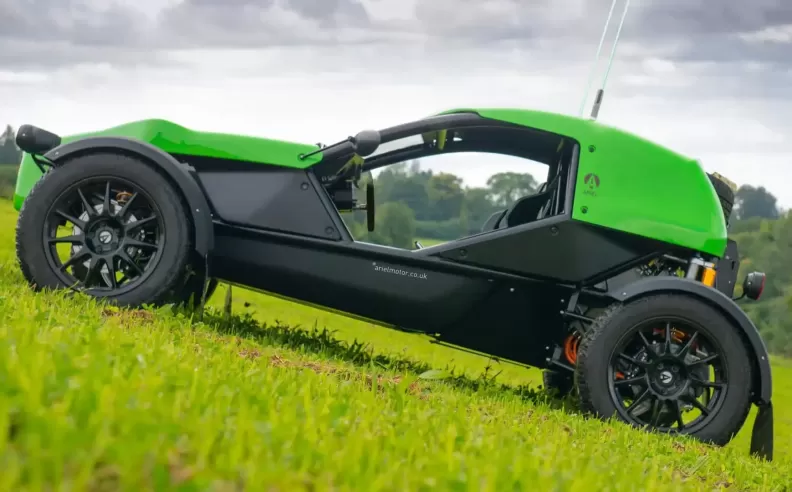
In the ever-evolving landscape of electric vehicles (EVs), the Ariel E-Nomad stands out as a remarkable example of how innovation can merge with off-road capability. With its rear-wheel drive and impressive torque delivery, this vehicle promises a driving experience that's both exhilarating and distinctively unconventional. Unlike many electric vehicles that struggle with weight, the E-Nomad's design philosophy prioritizes lightness, ensuring that it’s not just another heavy electric ride.

The Ariel E-Nomad is based on the Nomad 2, a model known for its ruggedness and agility, but it takes a sharp turn with its all-electric setup. Gone is the turbocharged 2.3-liter four-cylinder engine from the Focus ST, replaced by a single electric motor driving the rear wheels. This motor delivers 281 horsepower and a robust 361 pound-feet of torque, propelling the E-Nomad from 0 to 60 mph in just 3.4 seconds—a feat that mirrors its combustion-engine counterpart.
Weighing in at a mere 1,975 pounds, the E-Nomad is significantly lighter than many of its electric competitors. This low weight is achieved through several design choices, including the removal of conventional body parts like doors, and the use of a lightweight, bio-composite body made from flax fibers. This material not only reduces weight by 9% compared to carbon fiber but also boasts a 73% reduction in CO2 emissions during manufacturing. Additionally, this bodywork is recyclable, aligning with the E-Nomad’s eco-friendly ethos.
To keep the vehicle light, Ariel opted for a relatively small 41.0-kilowatt-hour battery. This battery offers a range of approximately 150 miles on a single charge, more than sufficient for its intended weekend warrior role rather than daily commuting. The battery pack is strategically mounted behind the bulkhead to enhance weight distribution, and it weighs less than 661 pounds—about a third of the vehicle's total weight. Fast charging capabilities allow the battery to recharge from 20% to 80% in under 25 minutes using a home fast charger.
The E-Nomad’s drivetrain is composed of a compact and efficient setup, with the electric motor, single-speed transmission, and inverter together weighing just 203 pounds. This setup also includes a limited-slip differential, crucial for maintaining traction on challenging terrains. Computational fluid dynamics (CFD) software played a key role in refining the vehicle's aerodynamics, resulting in a 30% reduction in drag coefficient.
Although Ariel does not currently plan to put the E-Nomad into production, the company intends to gauge consumer reactions and continue developing the vehicle through prototype testing. This cautious approach reflects a broader trend among niche automotive manufacturers, reminiscent of Caterham’s Project V—a lightweight, rear-wheel-drive electric sports coupe also aiming to capture the "light is right" philosophy.
In the realm of weekend toys and off-road adventures, the Ariel E-Nomad represents an exciting glimpse into what the future of electric off-roading might hold. With its impressive performance, innovative materials, and eco-friendly design, it stands as a testament to the potential of lightweight, high-performance electric vehicles. As the automotive world eagerly awaits further developments, the E-Nomad’s unique blend of technology and fun is sure to keep enthusiasts hopeful for its eventual green light.

Wael is an automotive content writer specializes in creating written content for Motor 283. Producing a wide range of content, including blog posts, articles, product descriptions, reviews, and technical guides related to cars, trucks, motorcycles, and other vehicles, with an unprecedented passion for cars, and motorcycles.
